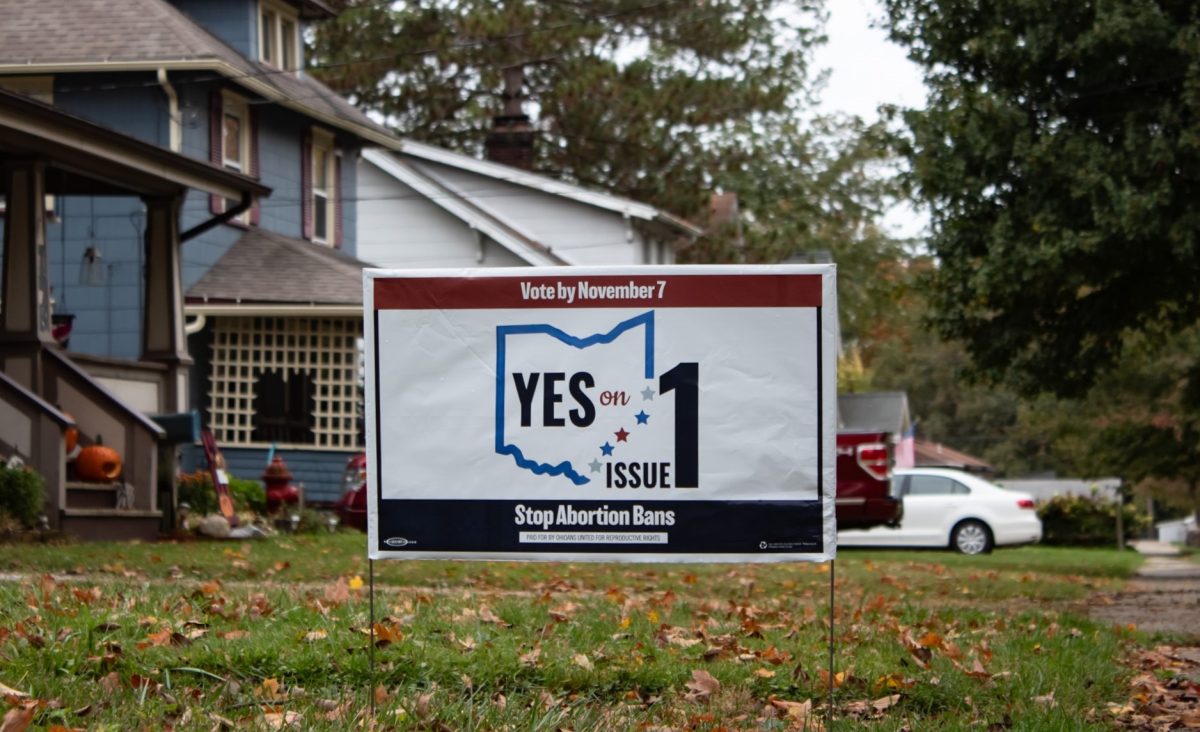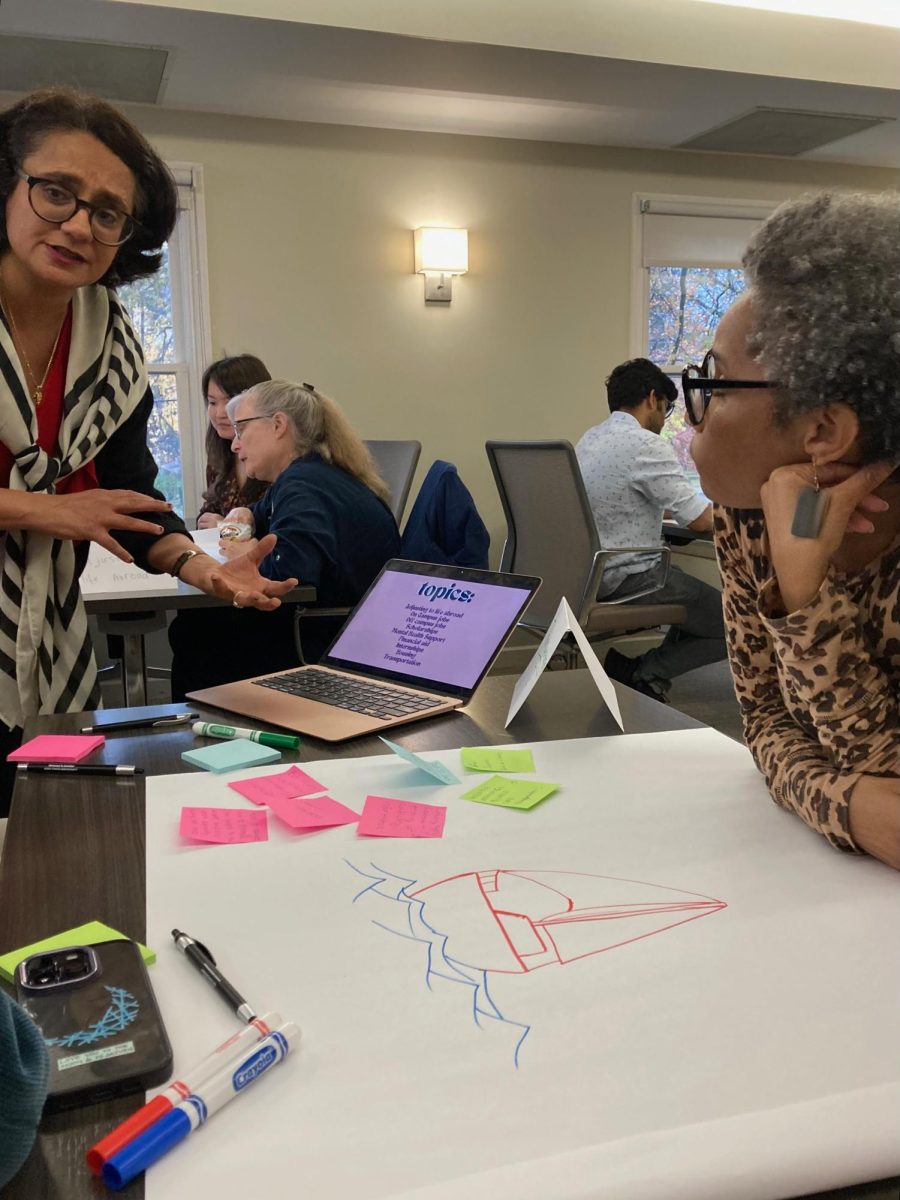As a result of the Nov. 7 election, Issue 1 passed, allowing legal abortions past the six-week ban and access to miscarriage care, contraceptives and fertility treatment.
The League of Women Voters of Kent’s palm card said patients would be able to receive abortions until viability of the fetus except in cases when the patient’s life or physical health is endangered.
Sherry Rose, president of the League of Women Voters of Kent, explained how many view Issue 1 as solely an abortion issue when it should be viewed pertaining to reproductive health care overall.
Issue 1 does not solely focus on reproductive health care pertaining to abortion, but also reproductive health care regarding miscarriages, rape situations and fertility treatment, she said.
Rose said the Amendment does not include gender-reaffirming care, which is healthcare consisting of medical, surgical, mental health and non-medical services for trans and non-binary individuals, and has no effect on parental rights, which involves parents giving consent to minors’ medical operations like an abortion.
“There is nothing in the Amendment that changes Ohio laws around parental consent or anything else that would change laws relating to parental rights,” Rose said.
The impacts of the passage of Issue 1 includes protection of contraceptives and future contraception legislation, Rose said.
“There have been pieces of legislation that have been introduced, within the legislature, that mention contraception,” Rose said. “We know that is being talked about, we haven’t seen exact legislation for that but we know that is a possibility in the future.”
Mallory Good, a first-year political science major and campus communications coordinator of the organization Students for Issue 1 Kent State University, said Ohio will not see similar legislation to the “Heartbeat Bill,” which does not allow performing an abortion without first checking for a heartbeat, with the passage of this amendment.
“Under that bill, there was an 11-year-old girl, in the state of Ohio, who was actually forced to carry a pregnancy to term just earlier this year and that is… in my opinion a very severe human rights violation,” Good said.
Mark Harrington, executive director of Created Equal, an Ohio-based anti-abortion organization known for their graphic images of aborted fetuses, said the “Heartbeat Bill” prevents abortion when a heartbeat is detected, not just after six weeks.
“[The Heartbeat Bill] outlaws abortion at a detectable heartbeat so that can happen sometimes as early as six weeks but generally not always,” Harrington said. “When people refer to it as the six-week ban, it’s actually not… it’s the detectable heartbeat.”
Another impact of the passage is allowing individuals to choose whether they want to pursue an abortion, miscarriage care or other reproductive health care inclusion in the Ohio Constitution, Good said.
“And that’s something that no one can take away from Ohioans in this generation and Ohioans 200 years away,” Good said. “So that’s really an incredible thing.”
Good said this amendment and similar legislation regarding reproductive health care does not solely pertain to women.
“It should be a woman’s right if she wants to have a child or not. If she’s married to her husband, it should be a joint decision, it should be a family decision,” Good said. “I don’t think 16-year-old boys should have to become fathers, if they don’t want to be.”
Harrington said the ability to make changes regarding future policies about abortion will no longer be in the hands of Ohio voters as a result of the passage.
“There should be the ability to make change in policy, and that will be totally taken out of the hands of the Ohio voter if Issue 1 passes,” Harrington said.
The results of the Ohio election will also have the ability to help other states determine legislation surrounding reproductive health care, Harrington said.
“It can have impacts across the country and win or lose other states are going to look at the results in Ohio and plan accordingly because there’s efforts to change the Constitution in several states in 2024 and beyond,” Harrington said.
Regardless of the result, Harrington said people will remain divided on the topic of abortion.
“Win or loss, abortion and the debate over abortion isn’t going away,” Harrington said. “To think that just as when Roe v. Wade was in effect, a lot look to it as a settled issue, well it’s not settled and won’t be settled.”
Rose said it is important for Millennials and Generation Z to realize the passage of Issue 1 affects their generations the most.
“This is going to be the legislation going over your bodies because most of the Gen X’ers and the Baby Boomers, we’re kind of past that stage in our lives,” Rose said. “I think that long term this piece of legislation is dictating more about the younger generation than it is the older generation.”
Adriana Gasiewski is a staff reporter. Contact her at [email protected].





